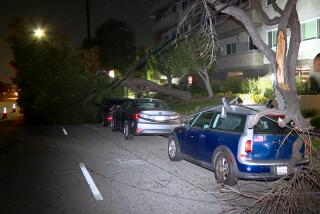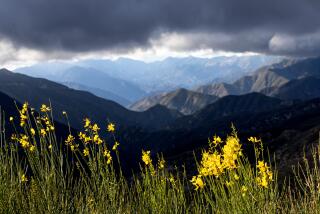Powerful Winds Pound Southland
- Share via
Winds gusting to 77 mph huffed and roared through Southern California on Monday, killing one man, flipping big rigs like toys, snapping power lines and tormenting sleepless residents with an overnight onslaught that caused mainly minor damage but offered a quirky version of Mother Nature’s mean side.
The high winds, produced by an unusual collision of whirling pressure systems, prompted authorities to close two key freeways--a 20-mile stretch of Interstate 15 through the Inland Empire and 128 miles of Interstate 10 from Indio to the Arizona border. They also created an odd air of chaos across the region--revealing gorgeous mountain views even as motorists dodged flying debris and discarded Christmas trees skittered like tumbleweeds.
“It’s like one big sandstorm,” said CHP Officer Tami Low. “Wear goggles. It’s pretty bad. . . . We haven’t had anything this bad in a long time.”
In a rare move, authorities recommended that campers and big rigs stay off the freeways throughout the Los Angeles region--a precaution usually limited to canyons and mountain passes. At least nine big-rig trucks were reported overturned on Interstate 15 and five more had flipped on Interstate 10, which was reopened by early evening, the CHP reported. No one was injured seriously, but officials said the wind was hindering efforts to right the trucks.
A 56-year-old Los Angeles man, whose name was not released pending notification of his family, was fatally crushed by a falling tree, Los Angeles police reported.
The man was standing with a friend in an open field in the 10300 block of McBroom Street in Sunland about 9 a.m. when the tree, more than 60 feet high, fell on him, authorities said. He died several hours later at a hospital of massive internal and external injuries.
About 280,000 homes and businesses were at least temporarily without electricity in a broad swath from the San Fernando Valley to Riverside, Orange and San Bernardino counties. By late afternoon, more than 50,000 remained without power, many of their residents facing a chill winter evening without heat. Many other residents had to do without telephone service.
Charlotte Forte-Taylor and her three children huddled around their kitchen table in Altadena, doing homework by candlelight. The family had been without electricity since 6 a.m. “We’ve been talking about getting a hotel room but I don’t know if I want to incur that kind of cost right now,” Forte-Taylor said.
Winds were so strong in parts of the Inland Empire that entire rows of utility poles were blown out of the ground and fallen power lines were suspected as the cause of a fire that caused about $100,000 damage at an Arcadia apartment complex.
Tumbling trees and limbs also damaged homes throughout the region.
A year-old baby escaped injury when the crib in which she was sleeping was partly crushed beneath a pine tree that crashed through the roof of the family’s Altadena apartment. Splintered remnants of the wooden crib remained in the second-story bedroom--evidence of how close the child came to serious injury.
“I just thank God,” said Yesenia Basquez, mother of Jessica Romero.
Harvey and Ruth Friddle and their two young daughters were startled when a pine tree crashed through the roof of their Altadena home. The whole family was sleeping in the master bedroom because the girls, ages 2 and 7, had been frightened by the howling wind.
“It sounded like a violent earthquake,” said Harvey Friddle of the impact of the tree with the roof. “The house was rocking like a ship.”
A home under construction for abused teenagers in Altadena went down “like a house of cards,” said staffer Elise Dorsey, who watched it tumble. In San Fernando, residents said the damage caused by falling trees resembled what they saw after the 1994 earthquake. Drivers in Arcadia and Van Nuys suffered minor injuries when trees fell on their vehicles. “It stopped the truck dead in its tracks, cracked the windshield and knocked me in the head,” said electrician John Saenz, 36, who was driving in Van Nuys. “I didn’t see it coming.”
The highest gust--77 mph--was reported in Glendale, while gusts of 70 mph were reported in the Malibu hills. Elsewhere, winds reached 60 mph in mountain passes and held at 30 to 40 mph throughout much of the region, said Jon Erdman, a meteorologist for WeatherData Inc., which provides forecasts to The Times.
He said the unusual winds were caused when high-pressure systems over Northern California and the Great Basin of Nevada met a low-pressure system south of Arizona. The clockwise winds from the high-pressure systems combined with the counterclockwise winds from the low-pressure system “like an eggbeater with two blades that rotate and come together at the middle,” Erdman said. “California sits right where the blades come together.”
Many residents spent the day cleaning up fallen branches amid winds that were not expected to abate until this afternoon. Doree Allison was outside his house in Altadena as firefighters doused a small fire that fallen power lines had sparked on his front lawn. And a pine tree had fallen on his pickup truck, crushing it.
“This is a helluva way to start off the new year, ain’t it?” Allison said.
Arriving on the day that many employees were headed back to work after the holidays, the winds managed to upset daily rhythms in all kinds of ways, making some people resemble sleep-deprived zombies and introducing what could be a first, even for disaster-hardened Southern California: the flying-debris hazard.
For 5,400 employees at the Jet Propulsion Laboratory in La Canada Flintridge, where an uprooted tree fell across the main steps of the administration building, the winds spelled a day off. Officials sent workers home early to avoid mishaps. It was the first time in memory that the facility, which is run by Caltech for NASA’s space program, has been closed by weather.
Others coped with rattled nerves after spending much of the night listening to the wind hammer their homes. “I felt like the whole house was going to fall down. The gates were banging. The glass doors felt like they were going to break,” said Arcadia resident Stefany Almaden as she cleaned up debris in front of her house. Almaden faced with little relish the first day of graduate classes Monday at Cal State Los Angeles. “I’ll sleep sitting up,” she said.
A jangled Celina Alaniz, a 16-year-old student in El Monte, said she spent the night huddled awake in bed, clutching her teddy bear. “I was scared,” she said.
Driving on the Foothill Freeway became an obstacle course as plywood panels toppled from construction sites. The strong winds created delays of up to an hour for Metrolink commuter trains, which had to stop while crews removed more than a dozen trees and telephone poles blown onto the tracks. Trains were running at slower speeds--10 to 15 mph less than the top speed of 79 mph traveled through open stretches--as a precaution, officials said.
In Orange County, winds as high as 65 mph felled a 400-year-old California live oak tree at the entrance of a county-owned park and left rangers grieving as though a family member had been struck dead.
“We lost a lot of trees [Monday], but none was as heartbreaking as that one,” said Dan Scharton, the groundskeeper at O’Neill Regional Park in Trabuco Canyon, where the 50-foot tree lay “like some giant wounded bird.”
An advertising blimp ran into trouble in the winds off Dana Point, but the pilot managed to guide the craft to safety and land at Brown Field in San Diego County.
In the mountain community of Crestline in San Bernardino County, residents reported a citywide power outage for more than five hours Monday. The winds compounded problems created by a recent snowstorm, and seven area schools were closed for the day because of the combined perils.
“Between the snow and the winds, you can’t travel the roads. It’s just been a mess,” said Cindy Anderson, a civilian clerk at the San Bernardino County sheriff’s station in neighboring Twin Peaks.
Times staff writers Angie Chuang, John Gonzales, Larry Gordon, Michael Granberry, David Haldane, Peter Y. Hong, Solomon Moore, Bob Pool, Frank B. Williams, Martha Willman and correspondent Mayrav Saar contributed to this story.
* WINTRY GUSTS
Winds that blasted the region were cold Santa Anas. B1
More to Read
Sign up for Essential California
The most important California stories and recommendations in your inbox every morning.
You may occasionally receive promotional content from the Los Angeles Times.










